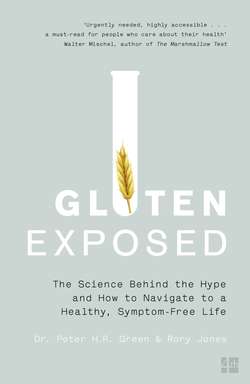Читать книгу Gluten Exposed: The Science Behind the Hype and How to Navigate to a Healthy, Symptom-free Life - Rory Jones, Dr. Green Peter - Страница 12
Why Individuals Don’t Go to Doctors
ОглавлениеWhenever I read anything, it says, “Consult your doctor before doing any exercise.” Does anybody do that? I kind of think my doctor has people coming in with serious problems. I don’t think I should be calling him and saying, “Hi, this is Rita, I’m thinking of bending at the waist.”
—RITA RUDNER
There are various reasons people do not rely on doctors for medical advice and treatment, but food and lifestyle issues seem to raise a red flag on both sides of the desk. Many with unresolved symptoms assume the doctor trivializes them as nonserious and therefore they avoid the discussion. Others state that they think the doctor views a gluten-free diet as a lifestyle rather than a health decision. And if going gluten-free is not to treat celiac disease, a wheat allergy, or another diagnosed condition but gives you a better quality of life, you both may be right.
My Doctor Doesn’t Listen/Have Time
My doctor said, “You have celiac disease. Go on a gluten-free diet and I’ll see you in six months.” That’s when we got really frustrated and really lost. My doctor sent me home without any guidance.
(ARLENE, 18)
Admittedly, not every doctor is a talented listener. Understanding the experience of illness comes with practice, and some physicians need to be reminded that the antibodies on the lab sheet are attached to a person. But there are two sides to this dialogue, and patients often fashion their narratives to give the doctor what they think the doctor wants to hear. The result can be unsatisfactory for both parties.
Allergies and food intolerances—along with celiac disease and other autoimmune diseases—have mushroomed in the past decade for reasons that are still being actively researched. Many physicians are therefore still examining the dietary and potential microbiotic aspects of their specialties, so you should request a professional referral for dietary counseling if your diagnosis requires a restricted diet.
Food restriction is currently the only treatment for those with celiac disease and food allergies, and a major component of others, such as diabetes and kidney stones. Trained and registered dietitians have the time to explore the nuances of these various diets, and you should turn to them for expert advice after—not before—diagnosis.
You Got Off on the Wrong Floor
Where you stand depends on where you sit: your specialty can affect, even determine, your position.
—JEROME GROOPMAN, M.D., HOW DOCTORS THINK
Many people look to alternative sources for a diagnosis because they feel that their doctor “sees me only as someone with irritable bowel syndrome.” Diagnoses stick until it can be proven that you have something else—and negative test results often leave people categorized and displeased with the answer. Patients with GI symptoms usually have GI issues; those with neurological symptoms usually have neurological issues. Doctors are taught in medical school that “the common occurs commonly.” But frequently GI issues can cause neurological symptoms, as is seen in celiac disease and other malabsorption conditions that cause vitamin and mineral deficiencies leading to ataxiafn1 (lack of coordination) and other gut-brain reactions.
If you need a raincoat, you won’t find it in the shoe department. It is often necessary to run different tests or seek out a different specialist who is willing to change his/her position on an issue.
Financial Issues
The insurance and financial landscape of medicine is a reason cited by some people in the U.S. to explain their avoidance of medical care. If you continue to have unresolved symptoms and are self-diagnosing and self-treating without the benefit of medical testing, you should seek out a clinic or practice that will accommodate your needs, before an underlying condition sends you to the emergency room.
Where you get your medical information will ultimately determine your long-term health.
Ask yourself if you are seeking alternative sources of medical information mainly to justify a gluten-free diet as the answer for ongoing symptoms. As 19th-century French physiologist Claude Bernard said, “It is what we think we know already that often prevents us from learning.”
